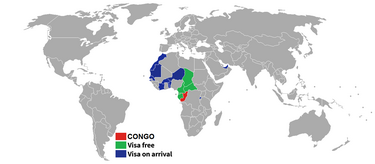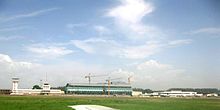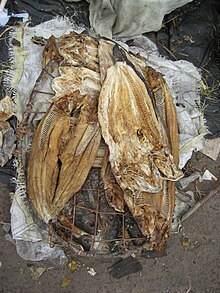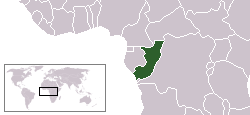The Republic of the Congo is a country in Central Africa. It is commonly referred to as Congo-Brazzaville to distinguish itself from its giant neighbour, the Democratic Republic of the Congo (Congo-Kinshasa).
One of the most sparsely populated countries in Africa, the Republic of the Congo is rich in diversity and landscapes, with more than 60 languages spoken. The Kongo, the largest ethnic group, make up 48% of the population. Other prominent ethnic groups include the Sangha, the Teke, and the Mbochi. There is also a small European community, comprising 3% of the population.
The Republic of the Congo is a predominantly Christian country, with Roman Catholicism being the largest denomination in the country. It is a former colony of France. Independent African churches thrive in the country; Kimbanguism, a syncretic movement, has several followers here.
Endowed with pristine wilderness areas and charismatic fauna, there is plenty to do and see in the Republic of the Congo, even though it's not on most travellers' lists.
Regions
editWikivoyage divides Republic of the Congo into six regions.
| Coast and Mayombe (Pointe-Noire) Includes Kouilou department and Pointe-Noire, a major economic and commercial centre of the country, and the main centre of the country's massive oil industry. |
| Congolese Plateau (Djambala) The country's highest region by altitude is home to popular wildlife reserves, including the Léfini Faunal Reserve. |
| Cuvette (Owando) Includes the Odzala-Kokoua National Park (PNOK) which is on the tentative list of UNESCO World Heritage |
| Niari Valley (Dolisie) Includes Niari, Lékoumou, and Bouenza departments. |
| Pool (Brazzaville) Home to the capital Brazzaville, it serves as the traveller's main entry point to the country. |
| Sangha and Likouala (Ouesso) The northernmost departments of the country. Both departments are completely covered in forests, and are home to a large pygmy population. |
Cities
edit- 1 Brazzaville — the capital is home to one third of the country's people, and has been designated a "City of Music" by UNESCO
- 2 Pointe Noire — a port city
- 3 Dolisie — a busy logging town that attracts few foreigners
- 4 Mossendjo — the regional hub city of the Chaillu Massif mountainous region
- 5 Djambala — a good base for visiting the Léfini Faunal Reserve
- 6 Owando — considered one of the best places to visit in the north of Republic of Congo
- 7 Ouésso — a transit hub in the remotest far north of the country, in a territory with many nearby Pygmy villages.
Other destinations
edit
- 1 Conkouati Reserve — the most bio-diverse park in the country and includes the only marine-protected area in Congo
- 2 Tchimpounga Sanctuary — the largest chimpanzee sanctuary on the African continent
- 3 Dimonika Biosphere Reserve — a reserve covering lowland rainforest and savanna
- 4 Mount Fouari National Reserve — big game such as elephant, leopard and buffalo still roam here
- 5 Ile Mbamou — a government-owned island that is about one hour from Brazzaville
- 6 Lesio Louna Gorilla Reserve — a special reserve for endangered western lowland gorillas, bounded by three rivers
- 7 Lefini Reserve — the country's best known reserve, bordering Lesio-Louna to the north
- 8 Odzala-Kokoua National Park — the country's most famous national park
- 9 Nouabalé-Ndoki National Park — the largest and most remote of Congo's national parks and reserves, in the far north bordering the Central African Republic's Dzanga Sangha National Reserve
Understand
editHistory
editFollowing independence as the Congo Republic on August 15, 1960, Fulbert Youlou ruled as the country's first president until labour elements and rival political parties instigated a three-day uprising that ousted him. The Congolese military took charge of the country briefly and installed a civilian provisional government headed by Alphonse Massamba-Débat.
Under the 1963 constitution, Massamba-Débat was elected President for a five-year term but it was ended abruptly with an August 1968 coup d'état. Captain Marien Ngouabi, who had participated in the coup, assumed the presidency on 31 December 1968. One year later, President Ngouabi proclaimed Congo to be Africa's first "people's republic" and announced the decision of the National Revolutionary Movement to change its name to the Congolese Labour Party (PCT). On 16 March 1977, President Ngouabi was assassinated. An 11-member Military Committee of the Party (CMP) was named to head an interim government with Col. (later Gen.) Joachim Yhombi-Opango to serve as President of the Republic.
After decades of turbulent politics bolstered by Marxist-Leninist rhetoric, and with the collapse of the Soviet Union, Congo completed a transition to multi-party democracy with elections in August 1992. Denis Sassou Nguesso conceded defeat and Congo's new president, Prof. Pascal Lissouba, was inaugurated on 31 August 1992.
However, Congo's democratic progress was derailed in 1997. As presidential elections scheduled for July 1997 approached, tensions between the Lissouba and Sassou camps mounted. On 5 June, President Lissouba's government forces surrounded Sassou's compound in Brazzaville and Sassou ordered members of his private militia, known as "Cobras", to resist. Thus began a 4-month conflict that destroyed or damaged much of Brazzaville and caused tens of thousands of civilian deaths. In early October, Angolan troops invaded Congo on the side of Sassou and, in mid-October, the Lissouba government fell. Soon thereafter, Sassou declared himself President. The Congo Civil War continued for another year and a half until a peace deal was struck between the various factions in December 1999.
In sham elections in 2002, Sassou won with almost 90% of the vote cast. His two main rivals Lissouba and Bernard Kolelas were prevented from competing and the only remaining credible rival, Andre Milongo, advised his supporters to boycott the elections and then withdrew from the race. A new constitution, agreed upon by referendum in January 2002, granted the president new powers and also extended his term to seven years as well as introducing a new bicameral assembly. International observers took issue with the organization of the presidential election as well as the constitutional referendum, both of which were reminiscent in their organization of Congo's era of the one-party state.
Elections in July 2009 were boycotted by opposition parties. Inevitably, Sassou was re-elected, but with a questionably high turnout. Demonstrations in Brazzaville were firmly put down by riot police.
The Republic of the Congo's sparse population is concentrated in the southwestern portion of the country, leaving the vast areas of tropical jungle in the north virtually uninhabited. Thus, the Republic of the Congo is one of the most urbanized countries in Africa, with 85% of its total population living in a few urban areas, namely in Brazzaville, Pointe-Noire, or one of the small cities or villages lining the 332-mile (534 km) railway which connects the two cities. In rural areas, industrial and commercial activity has declined rapidly, leaving rural economies dependent on the government for support and subsistence. Before the 1997 war, about 15,000 Europeans and other non-Africans lived in Congo, most of whom were French. Only about 9,500 remain.
Economy
editThe country has large reserves of petroleum, the mainstay of the country's economy, and accounts for 80% of the country's exports. Although the country is one of the leading oil producers in Africa, this hasn't exactly translated into prosperity. Political instability, corruption, inadequate infrastructure, heavy dependence on oil, a neglected educational system, and the effects of the 1997 civil war mean that the country is among one of the least developed countries in the world. Most Congolese people live in poverty and unemployment is rampant.
Despite these factors, the government has been keen on diversifying the economy and actively encourages foreign investment.
Tourist information
edit- Republic of the Congo Tourism website
Get in
edit
Visa requirements
editThe Republic of the Congo is not a country you can just waltz into. There are few visa-free arrangements in place, and thus, almost everyone requires a visa to visit the country.
Citizens of the following countries can obtain a visa on arrival: Benin, Burkina Faso, Ivory Coast, Mauritania, Morocco, Niger, Rwanda, Senegal, Togo, and the United Arab Emirates.
For everyone else, you must possess a valid passport and you must submit the following: two completed visa application forms, two passport photographs, airline tickets, a travel itinerary, an invitation letter from a Congolese individual or organisation (a hotel reservation will normally suffice), and proof you've been vaccinated against yellow fever.
Visa fees tend to be very expensive (The Congolese embassy in the United States charges $200 for visa applications), so plan accordingly. Congolese embassies recommend that you submit all relevant documentation (usually a month before your trip) in advance. Visas typically take 7-10 days to process.
If you hold an "official letter of invitation" you can, in theory, enter the country without a visa, but it may be difficult to obtain because there's little information available on how to obtain it.
By plane
edit
- Maya-Maya Airport (BZV IATA), ☏ +242 820-996. The main airport of the country is in Brazzaville. It offers flights from Paris, Casablanca, and so on.
By car
editIt's safe to drive in the Republic of the Congo. A good sealed road goes north from Brazzaville, but only as far north as President Sassou's hometown of Oyo. Beyond Oyo, the roads get very bumpy and are totally impassable in the rain. It is also very hard to get a rental car that you can drive yourself.
By boat
editPassenger and VIP ferries operate daily between Brazzaville and Kinshasa roughly every 2 hours between 8AM and 3PM. Prices for the ferries are: US$15 for the passenger and US$30 for the VIP ferry. The VIP ferry is recommended as these are brand new boats and are not as cramped. A valid visa for both countries is required in either direction. The bureaucracy at either end require some time. Entry and exit procedures in Brazzaville are "easy" and straight forward and people are very helpful in assisting to get through without troubles. In contrast, these procedures are a bit difficult in Kinshasa and depend much on whether you are an individual traveller or assisted by an organisation or an official government representative. There are also speed boats to hire, either in a group or alone (price!), however, it is not advisable to book them as they really speed across the river along the rapids.
Barges follow the Congo, then the Oubangui, rivers right up to Bangui.
Get around
editBy shared taxi or minibus
editRidiculously cheap shared taxis and minibuses run on an ad hoc basis between towns and villages, crammed with Congolese villagers taking all sorts of livestock for sale in Brazzaville.
By taxi
edit
Taxis in the Republic of the Congo do not have a meter, which means you have to negotiate for a reasonable fare before going anywhere. Don't expect this to be an easy process if you do not possess solid French language and negotiation skills.
In the capital city, Brazzaville, taxis are white and green in colour. If you want to go to the city centre from the airport, it will cost you 3000 CFA. In the main city, however, the official taxi fare stands at 700 CFA.
By train
edit
The Congo-Ocean Railway (COR, or CFCO) re-opened between Pointe-Noire and Brazzaville in Apr 2023 after a 7-year closure. It is scheduled to take 16 hours to complete the 502 kilometres (312 mi) journey. It is the only land route between Congo's two major cities.
Talk
edit- See also: French phrasebook
The official language of the country is French. The main indigenous languages are Kituba and Lingala.
See
edit
- Odzala National Park
- Gorillas in Lesio Louna Gorilla Reserve.
- Colonial and post-colonial architecture in Brazzaville.
- Sangha Trinational - a forest in the Sangha and Likouala region that is an UNESCO World Heritage Site (shared with Cameroon and the Central African Republic).
Do
editFish for the Goliath Tiger Fish on the Congo River — the largest fish ever caught was 56 kg.
Buy
editMoney
edit|
Exchange rates for CFA francs
As of January 2024:
Exchange rates fluctuate. Current rates for these and other currencies are available from XE.com |
The currency of the country is the Central African CFA franc, denoted FCFA (ISO currency code: XAF). It's also used by five other Central African countries. It is interchangeable at par with the West African CFA franc (XOF), which is used by six countries. Both currencies are fixed at a rate of 1 euro = 655.957 CFA francs.
The U.S. dollar is not widely accepted.
ATMs
editAll Ecobank ATMs in the Republic of the Congo take Mastercard and Visa card for cash withdrawal.
Shopping
editThere is an artisan mart and boutiques in the market near the BDEAC (Banque Developpement pour les Etats de l'Afrique Centrale). Really beautiful jewelry, masks, paintings, and other artwork.
All business is conducted in cash. Small change is very scarce and hard to come by. Do not accept torn or taped banknotes.
Eat
edit
There is good and healthy Chinese food at Osaka Restaurant, in Pointe Noire. The average price for a meal is US$12-18. All meals are served in nice clean dishes, the restaurant is indoors and has AC, with a back-up generator, just in case. Some of the workers speak English and French.
There are several great restaurants in Brazzaville. Any taxi driver can take you to one of these nicer places (FCFA 5000-15 000). Most places are closed on Sundays. Expect beers to be overpriced here (FCFA 1000-2000).
Drink
editPalm wine is a local favorite in the village. Beer is the favorite in town next to Fanta, Coke etc. There is also a local red wine (SOVINCO) imported from Gabon and the "brique", a liter of imported, mostly Spanish wine from the box.
There is a big price range on beer (FCFA 500-5,000) depending on what neighborhood and type of bar or restaurant you're in.
Produced in Congo under Heineken supervision: N'Gok (meaning "Crocodile", blond, Congolese), Primus (blond, Belgium, Central Africa), Mütsig (blond, French Alsace Region), Guinness (dark, Ireland), and Turbo King (dark, Central Africa)
Imported: Heineken and Bavaria
If the above is too much there is also water of various local and imported brands sold in 1.5 litre plastic bottles.
Sleep
editWork
editWith incredibly mild tax laws and a huge foreign population, the Republic of the Congo has ideal working conditions, but weak political conditions and excessive bureaucracy mean that many are often reluctant to take up work opportunities in the country. In addition, unemployment is quite high (40-50%), due in large part to a poorly developed education system.
Personal connections matter greatly in the Republic of the Congo, and the importance of having local contacts cannot be overstated. This being said, it's obvious to say that nepotism is quite common here.
Many NGOs are situated in Brazzaville. If you have a background in politics or international relations, working in Brazzaville won't be such a bad idea. In addition, the country is a great place to further develop your French language skills.
The government maintains a list[dead link] of sectors that are in need of investment or development. If you have any skills to offer, or if your company has anything to offer to the country, the government may be more than willing to help you out. As with any country, do your homework before getting into something.
Stay safe
editThe Republic of the Congo is generally a safe country. Crime rates tend to be low, and people can travel independently without any major worries or concerns. This said, crime such as robbery and assault remains a concern. As in any developing country, don't draw too much attention to yourself and do what the locals do. As the saying goes, "when in Rome, do what the Romans do".
Authorities
editThere are numerous police checkpoints throughout the country and it's difficult to know if you're coming across a police checkpoint since many of them are poorly marked. In the event you come across a police checkpoint, the police may ask you for your ID and they may conduct a thorough search of your vehicle. This is purely for security reasons, nothing more, nothing less.
Corruption in the Congolese police is widespread. Since members of the police earn low salaries, it's possible they may coerce you into giving them bribes or they may abuse their powers.
As with all authority figures, always remain calm, firm, and polite. If a policeman asks you to do something, just do it. Do not lose your temper if you end up meeting an ill-behaved official and do not challenge their authority.
Political unrest
editThe Republic of the Congo is one of the most corrupt and least efficiently governed countries in the world. Corruption, cronyism, and nepotism are widespread.
The Congolese have a strained relationship with their government and demonstrations against the government can turn violent. Although no major protests have occurred since 2015, keep an eye out.
Civil conflict
editAs aforementioned, many Congolese people are frustrated with their government, and this has often lead to open warfare. The most recent war was the "Pool War", in which more than 13,000 people were displaced in the Pool region. Although ceasefire agreements remain in place, frustrations with the government mean that conflict can erupt at any time.
Stay healthy
editPopulation estimates for this country explicitly take into account the effects of excess mortality due to AIDS; this can result in lower life expectancy, higher infant mortality and death rates, lower population and growth rates, and changes in the distribution of population by age and sex than would otherwise be expected. In any case use your common sense: do not have unprotected sex.
The likelihood of getting malaria is very high if effective preventative medication is not taken. The malaria caused by Plasmodium falciparum can be very serious. Medical attention should be sought if any symptoms are shown.
Tap water is not drinkable, if it's even running at all.
Medical care is substandard throughout the country. Hospitals lack modern equipment, necessary medical supplies and medications, and well-trained physicians, nurses and support staff.
- Netcare Clinic: B.P. 2422, Brazzaville, Tel: 547 0911 (Main Line) or 679 6711. This facility is a franchise from South Africa. It is clean, has facilities for 3 private rooms, an ambulance, a one bed emergency room, basic radiography, pharmacy and a laboratory with microscopy, haematology, and basic chemists. There are two main doctors, Dr. Ali, a Lebanese doctor who considered as the best medic in Netcare, and Dr. Stephan, a French doctor who is also a good doctor.
- Pharmacie Mavre Tel: 81 18 39. Located in Centreville, next to the Cabinet Dentaire building
Brazzaville has many pharmacies, but Pharmacie Mavré is recommended. Please remember to always check the expiration dates on boxes before purchasing any products.
Respect
editWhite travelers should take care while travelling in the Republic. Racial tension and discrimination is not uncommon here, so be safe and keep to yourself.
Connect
editYou can talk to your loved ones using any of the three mobile operators MTN, CelTel (now Zain), or Warid.
The local call rate are relatively cheap and cost you around FCFA 20-20 per minute.


